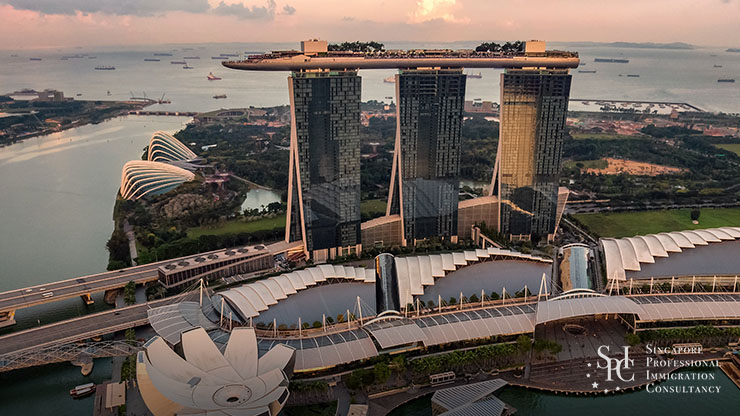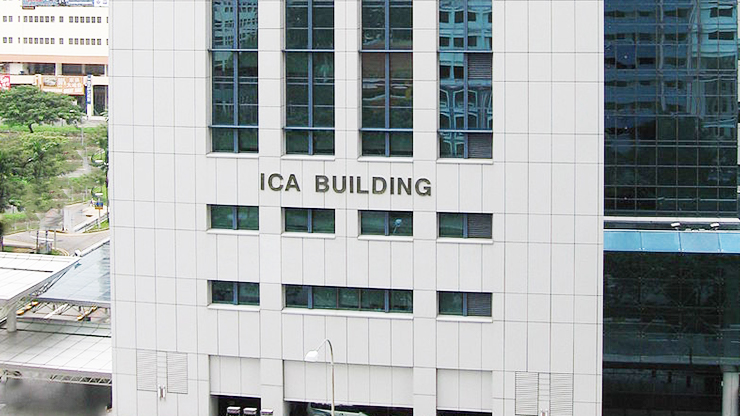The Tax Authority in Singapore is the Inland Revenue Authority of Singapore (IRAS). Their website is www.iras.gov.sg.
The Singapore Tax Year is: from 1 January to 31 December, and the tax return due date is 15 April.
Joint filing is not possible in Singapore and tax return extensions are also not possible in Singapore.
Individual income tax rates range from 0% at a chargeable income of SGD 20,000 or less and go up as high as 22% at a chargeable income of more than SGD 320,000. All Singapore citizens are liable for income tax. A Singapore permanent resident has personal tax liability if they have tax residency status. Their individual income tax rate is determined by their total income.
Who Pays Taxes In Singapore?
It is less important whether you are paid in Singapore or outside of Singapore and more critical where the services you receive employment income for are performed. All services performed in Singapore for which a person receives employment income are taxable. If you derive income from a service that does not happen in Singapore, then that income is not taxed unless you receive the income via a partnership that is based in Singapore.
There are, however, specific conditions under which the following can be exempt from income tax:
- Foreign-source service income
- Foreign branch profits
- Foreign-source dividend income
Profits of business ventures in Singapore are taxed under corporate income tax. However, for non-resident individuals, foreign source income is tax-exempt. Therefore, you are taxed in Singapore only on your income earned in Singapore. Any income earned overseas is not taxed by Singapore. There are very few exceptions to this rule for foreign tax credit.
The rules you need to abide by considering taxation will differ based on your tax residency. Furthermore, tax relief is available for those who set money aside for the Supplementary Retirement Scheme.
Singapore Tax Residency Status and Taxes
Individuals who have lived or worked in Singapore for at least 183 days in the year preceding the assessment year are subject to personal income tax. Some concessions are made for foreigners whose employment runs over two calendar years. This “two-year administrative concession” states that a person is considered a tax resident for both years as long as they have worked or lived in Singapore for a continuous period of no less than 183 days across both years, even if the entire time was not spent in Singapore per year.
Under certain circumstances, such as the Non-Ordinary Resident scheme, individuals who qualify can receive concessions for up to five assessment years consecutively.
A person is considered a non-resident if they are a foreigner who has not been living in or working in Singapore for more than 183 days in a calendar year. Non-residents are taxed as follows:
- Short-term employment (a maximum of 60-days per year) is exempt from tax. This rule does not apply to an exercising professional (consultants, speakers, experts, coaches, trainers, etc.), a public entertainer, or a director of a company.
- Singapore Employment income is taxed at 15% for individuals who were in Singapore between 61 to 182 days per year. If the progressive resident tax rates bring in a higher tax amount, then that rate will be used.
- All other income is taxed at 15% to 22%, including consultation fees and director remuneration and fees.
Income Subject to Taxation
Employment income:
This kind of personal income tax includes commissions, salary, bonuses, gratuities, leave pay, cash remuneration, gains from employee share plans, director fees, and allowances paid for services. There are other things in this category (like company cars) that are taxable, but individual circumstances apply in those cases.
Self-Employment and Business Income:
For this type of income, there are specific accounting principles under which financial accounts must be prepared. Business income is grouped together with other types of income to calculate the overall taxable income. For a non-resident, income derived from a profession, business or trade is taxed at 22%.
Personal service fees paid to a non-resident are taxed at 15%, which is the withholding tax calculated on the gross amount unless the non-resident opts for the 22% rate on their net income instead.
Losses and excess capital allowances are offset against all other chargeable income for the year. These losses and capital allowances are carried over indefinitely against future income. Corporate income tax is charged at a flat rate of 17%.
Investment income:
Singapore tax-resident companies will not pay income tax on dividends paid in the hands of shareholders, regardless of where the dividends arise from. This is only on the level of the one-tier dividend; all other tiers are taxed at the applicable income tax rates.
Investment income that arises from Singapore based financial institutions is exempt from tax. For non-residents, interest (aside from interest gained from institutions that are exempt from tax) is taxed at 15%.
Rental income derived from any property you own is grouped with your other income and is taxed at the rate applicable.
Tax Capital Gains:
In Singapore, there is no capital gains tax. If tax authorities view your movement of real estate as a trade, then there will be taxation as it then falls in a different category from capital gains. All buyers must pay stamp duty as well as any additional stamp duties that are liable. Some sellers may also be required to pay seller’s stamp duty.
Estate and Gift Tax:
Estate duty was ceased on 15 February 2008, and Singapore also does not tax gifts. So any form of this is not seen as taxable income and does not contribute to your gross tax payable, and does not influence your personal income tax rates. Foreign income does not qualify as a gift in Singapore.

Tax Filing and Payment
Once a tax assessment is issued, a person has one month in which to pay the amount due in one lump sum. Alternatively, tax is paid in instalments, with a maximum of twelve instalments allowed per year.
Double Tax Relief and Tax Treaties
Singapore grants some relief from double taxation for income derived from services rendered in countries without Singaporean tax treaties. This relief is also made available for foreign taxes that are taxed in Singapore, providing that Singapore has a treaty with that country.
At this time, there are 93 countries that have tax treaties with Singapore.
Singapore Income Tax Filing
It is your responsibility to file your income tax return each year before the cut-off date of 15 April. If your annual income is less than SGD 22,000 and you do not fall under tax residents, and you are not liable for taxation, but returns must still be filed. If you have been unemployed for the assessment period, then you still need to declare the zero income rate on your tax form.
Returns can be filed by mail or online. The Inland Revenue Authority of Singapore will send the appropriate paper tax form to you, should you request it, and the online form is made available from 1 March annually.
- Tax residents complete Form B1
- Self-employed individuals complete Form B
- Non-Resident individuals complete Form M
All income tax needs to be declared unless it is specifically exempt. Here are some examples of taxable benefits that you may receive from an employer:
- Overtime payments.
- A vehicle provided by your employer.
- A fixed monthly meal allowance.
- A fixed monthly transportation allowance, or such an allowance based on mileage.
- Any per diem allowance where the amount is in excess of acceptable rates.
- Reimbursements of dental or medical treatments for your dependents.

Failure to File and Late Filing
There are penalties for late filing and failure to file. Legal action can also be taken against an individual who does not file or who does not pay their income tax or other relevant taxes. The tax bill or notice of assessment is issued between May and September following a return. If you do not agree with the amount listed on the tax bill, you must inform the authorities within 30-days from the issue date of your tax bill. Reasons for your objection must also be stated.
Upon your receipt of the Notice of Assessment, you have 30-days in which to pay your tax amount. Even if you have sent an objection, any payment outstanding after 30-days is subject to penalties.
If you fall within an overseas income bracket that is not taxable, then you are not required to file a return. The following circumstances result in taxable overseas income:
- The overseas employment relies on your Singapore employment, so you are working on behalf of a Singaporean company overseas.
- Your overseas income is received through partnerships in Singapore.
- The Singapore government has employed you overseas.
If your overseas income received qualifies for taxation, you can declare it either under “other income” or “employment income”.
Failure to file, or late filing, enables IRAS to take the following steps:
- Issue an NOA (Estimated Notice of Assessment).
- Impose a late fee between SGD 150 and SGD 1,000. (Repeat offers are liable for higher fees).
- A court summons can be issued if neither the return nor the late fee has been received by the cut-off date.
Failure to pay the court penalty will likely result in imprisonment. Additional enforcement actions can include:
- Directives to your lawyer, employer, or bank to pay your IRAS debt.
- Legal actions against you.
- A Travel Restriction Order (TRO).
Withholding Tax
Withholding tax refers to tax that is withheld and paid to the IRAS when a non-resident person or business obtains an income from Singapore. So a part of the payment made by a Singapore company to non-residents must be paid to IRAS via withholding tax.
The term “withholding tax” thus refers to the taxable income amount that is withheld for the purpose of tax deductions. Non-resident individuals and companies can be liable for withholding tax.
Foreign sourced income derived by non-tax resident individuals is not taxable. Only Singapore sourced income falls within this category.

Frequently Asked Questions
Does rental income affect my personal income tax rate?
Yes, if you derive rental income from a property that you own and you fall within the tax residents category, the rental profit will affect your total Singapore income tax amount along with your gross income. If your total income, with the rental, is still lower than the minimum taxable income arising from employment and other forms of income within Singapore, then you still fall within the tax exemption category. However, you will still need to file a tax return.
What is considered tax-exempt income?
This will depend on whether you have tax residency or not. Inheritance tax is not always paid, and corporate income tax is calculated differently than personal income tax. Generally speaking, an income below SGD 22,000 is below the tax rate. Overseas income is not taxable, even when it is paid into a Singapore bank account.
Will I be notified when my personal taxes are due?
All taxes, including personal taxes, are due by 15 April every year. You will be able to access the forms online from 1 March, or you can request for them to be posted to you.
Where can I see the latest income tax rates?
The IRAS website has comprehensive information on income tax rates and all other information related to tax payable deductions.
Do Singapore permanent residents pay taxes depending on the local tax rate?
What matters here is the tax residency status that is dependent on income earned in Singapore that is tax payable. The income tax rate depends on income generated in Singapore, not PR or citizenship status. For income that is generated from companies outside of Singapore, the local tax rate does not apply. So even if you are a PR and make money from a Singaporean source, you will pay taxes according to the appropriate tax rate. You can calculate your tax rate using the information provided on the IRAS website.

 APPLY FOR SINGAPORE PR 2023/2024
APPLY FOR SINGAPORE PR 2023/2024 

